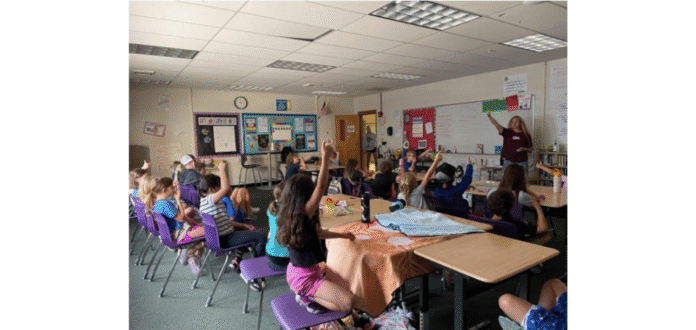"Empowering Young Minds: A Journey into Climate Awareness with ‘Environmental Health in a Box’"
Empowering Young Minds: "Environmental Health in a Box" Curriculum Launches in Missoula
Missoula, MT — On a bright Tuesday morning in July, Washington Middle School became a hub of excitement as Megan, an educator with Montana Health Professionals for a Healthy Climate, welcomed 25 eager children aged 6 to 9 from the Boys and Girls Club of Missoula County. This marked the inaugural lesson of the innovative “Environmental Health in a Box” curriculum, designed to equip young learners with essential knowledge about climate change and its implications for their health and environment.
The session commenced with an engaging icebreaker. Megan called out “Waterfall!” prompting the children to respond with a collective “Shhhhhhhh!” This playful interaction set the tone for a day filled with learning and discovery. Megan then introduced the day’s theme: climate, weather, and the planet. Her enthusiasm was infectious, as she encouraged the children to express their excitement with a spirited “Yay!”
A Journey Through Climate Education
The lesson featured an audiobook reading of The Magic School Bus and the Climate Challenge, which captivated the children’s attention as they followed Ms. Frizzle and her class on a global adventure exploring climate change. The story provided a foundational understanding of greenhouse gases and their effects on the atmosphere, while also showcasing diverse climates around the world.
After the audiobook, Megan engaged the children in a thumbs-up/thumbs-down activity to gauge their interest in the topic. The unanimous thumbs-up indicated a strong engagement, setting the stage for the next interactive segment.
Interactive Learning Activities
Megan introduced a hands-on activity where each child received a laminated card depicting either a geographical location (Sahara, Hawaii, Antarctica, or Montana) or a corresponding average temperature range (100–104°F, 75–85°F, 0°F, or 58–86°F). The children were tasked with finding their partners by matching their locations with the correct temperature, culminating in a “frozen high-five” to emphasize the concept of climate.
Once paired, the children lined up around the classroom, where their matches were verified by reading their cards aloud. One child representing Antarctica humorously exclaimed, “Zero degrees? I’d turn into an ice cube!” This light-hearted moment highlighted the children’s engagement and understanding of the material.
Megan then guided the pairs to different corners of the room based on their assigned locations, prompting them to act out what it felt like to be in their respective climates. The Sahara group fanned themselves dramatically, while the Antarctica group shivered with crossed arms. This physical activity reinforced the lesson’s core message: the significant impact of climate on daily life.
Reflection and Future Lessons
As the session drew to a close, Megan reflected on the importance of the curriculum for this age group. She noted that the activities effectively engaged the diverse range of children present and could be adapted for older students. For younger learners, she suggested introducing simpler definitions to enhance understanding and spark deeper conversations.
Megan emphasized the curriculum’s relevance for children in Montana, stating, “Living in Montana, these kids may not realize how special their clean, natural environment is. By instilling a sense of responsibility now, we prepare the next generation to tackle environmental challenges.” To reinforce the lesson, each child received a copy of Winston Churchill: One Bear’s Battle Against Global Warming, setting the stage for future discussions.
A Comprehensive Approach to Climate Education
The “Environmental Health in a Box” curriculum aims to empower children with the tools necessary to discuss their changing environment, protect their health from emerging threats, and express their thoughts and feelings. It fosters literacy through literature, fine motor skills through arts and crafts, gross motor skills through physical activities, and emotional intelligence through guided discussions.
This initiative is crucial in equipping young learners with the knowledge and skills to understand climate change, advocate for their environment, and cultivate a sense of responsibility for protecting the planet for future generations.
For afterschool programs interested in incorporating this curriculum, Montana Health Professionals for a Healthy Climate invites inquiries via email at [email protected].
About the Organization
Montana Health Professionals for a Healthy Climate is dedicated to promoting health and environmental sustainability through education and community engagement. Their innovative programs aim to inspire the next generation to become informed stewards of the planet.
Additional Resources
For further information and resources related to climate education and health, visit:
- American Climate Leadership Awards 2026
- Join ClimateRx
- Mental Health and Our Changing Climate: Children and Youth Report 2023
- Climate for Health Ambassador Training
- Climate for Health Resources
Photos by: Montana Health Professionals for a Healthy Climate
Written by Melody Irvine, Media Coordinator, Montana Health Professionals for a Healthy Climate
